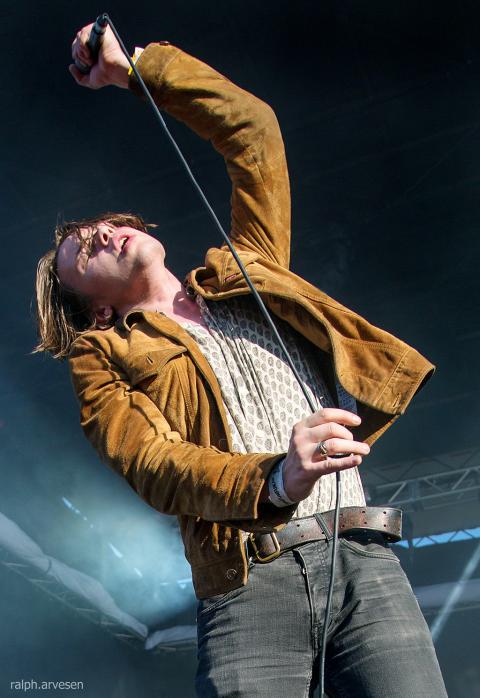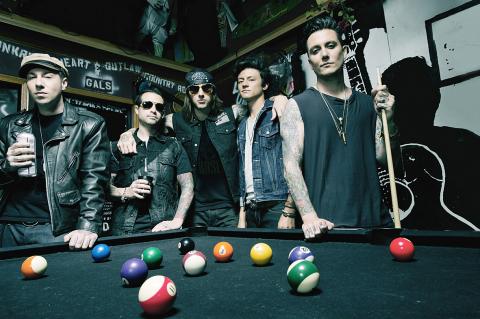There will never be another Metallica. The days of metal bands selling out stadiums and arenas on their own are, for the most part, dead and gone, stomped to death by YouTube and information overload indifference. Metal, outside of ‘tallica and other aging acts of a bygone era (Iron Maiden, Judas Priest), and the European 100-band bill, three-day romp-in-the-mud festival circuit, has been relegated to the mid-range.
If there is a “biggest band in mainstream metal” these days, it’s probably Avenged Sevenfold (A7X) from Huntington Beach, California. Founded just before the turn of the millennium, the So-Cal five piece began life as a far more extreme outfit, fanning the dying embers of screamo, combining emotionally evocative themes of general angst, anguish and darkness with the virtuoso dual lead guitar work of Synyster Gates and Zacky Vengeance. Cartoonish names aside, the boys really can play.
A decade and a half later, with the tragic and untimely death of drummer Jimmy “The Rev” Sullivan, Avenged Sevenfold has morphed into something else entirely — an arena metal band for an era when metal bands can no longer fill arenas on their own. Not that the band isn’t doing its best to fill those arena metal shoes. On their latest album, Hail to the King, singer M. Shadows even admitted to mimicking Metallica themselves on at least one song, This Means War, while comparisons to arena rock and metal mainstays such as Guns N’ Roses and the aforementioned Maiden ran rampant in reviews.

Photo Courtesy of Ralph Arvesen
It was Shadows and what he did, or rather stopped doing, that played a major role in the metamorphosis of Avenged Sevenfold’s sound. The first couple of albums featured him utilizing harsh screams almost exclusively, with bursts of cathartic and saccharine clean singing here and there. By the time the band’s third disc, City of Evil, came out in 2005, Avenged Sevenfold had nearly ditched its metalcore roots altogether in favor of a far more accessible hard rock sound. Shadows, who had some well-documented throat problems that eventually resulted in surgery, left his screaming days behind him, something he says was always planned in the evolution of the band regardless of his medical condition.
Whatever the case may be, with pop-rock songwriting sensibilities and a heavy dose of major label PR expertise behind them, Avenged Sevenfold have become the most successful, widespread metal band of an age in which people illegally download rather than buy and stream rather than attend. The band’s symbol, the Deathbat, a skull with bat wings for the uninitiated, has been tattooed on hardcore fans around the world and even stars in its own video game. They’ve become the gateway band for those who will eventually look for bands of a more extreme nature.
Next week will mark the second time that Avenged Sevenfold plays in Taiwan, with the last show marred by an abbreviated set due to a dispute between the band’s management and the promoter over an allegedly oversold venue. This time around, Live Nation Taiwan (理想國演藝) is at the helm on the promotional front in its debut foray into the metal realm. Here’s hoping, for the fans’ sake, that the show will go smoothly and the crowd, arena-sized or not, is finally treated to the full Avenged Sevenfold experience.

Photo Courtesy of Live Nation Taiwan
■ Avenged Sevenfold plays on Jan. 16 at TPEC Gymnasium (天母體育館), 101, Zhongcheng Rd Sec 2, Taipei City (台北市忠誠路二段101號). Tickets are NT$1,800 to NT$3,300. Doors open at 6:30pm and show starts at 7:30pm.
On a completely different note, next week, critically acclaimed Copenhagen post-punk/noisy Joy Division worshipers Iceage blow into town. The band got its start in 2008 when members Elias Bender Ronnenfelt (vocals), Johan Surrballe Wieth (guitar), Jakob Tvilling Pless (bass) and Dan Kjaer Nielsen (drums) were still in high school. Since then, they’ve released three studio albums, mixing the bleakness of Ian Curtis-style gothic rock with the immediacy of punk and the noise, confusion, and uncomfortable edge of its post-punk predecessors.
Iceage’s latest offering is Plowing into the Field of Love, an album which sees the band mature both literally and in the musical sense, growing somewhat beyond the aggression of their teenage years for a more nuanced approach — one that leans more towards the viscerally unnerving style of Nick Cave and the Bad Seeds than it does punk rock’s straightforward delivery. Ronnenfelt slurs his vocal lines over structures that move between blues, rock, folk, and understated punk, playing the well-worn part of the poetic drunk (which is always a mere stone’s throw away from Jim Morrison’s bloated romantic buffoon).
It’s always interesting to watch a band grow and see how they find a balance between progression and getting their collective head stuck up a very uncomfortable place. So far, Iceage seem to have avoided the latter, which is not an easy feat to accomplish when you’re young and the periodicals of note are desperately looking for an act worthy of building up to be the next big thing.
■ Iceage plays Wednesday at The Wall, B1, 200, Roosevelt Rd Sec 4, Taipei City (台北市羅斯福路四段200號B1). Tickets are NT$1,000 presale and NT$1,200 at the door. Doors open at 7:30pm and show starts at 8pm.

June 9 to June 15 A photo of two men riding trendy high-wheel Penny-Farthing bicycles past a Qing Dynasty gate aptly captures the essence of Taipei in 1897 — a newly colonized city on the cusp of great change. The Japanese began making significant modifications to the cityscape in 1899, tearing down Qing-era structures, widening boulevards and installing Western-style infrastructure and buildings. The photographer, Minosuke Imamura, only spent a year in Taiwan as a cartographer for the governor-general’s office, but he left behind a treasure trove of 130 images showing life at the onset of Japanese rule, spanning July 1897 to

In an interview posted online by United Daily News (UDN) on May 26, current Chinese Nationalist Party (KMT) Chairman Eric Chu (朱立倫) was asked about Taichung Mayor Lu Shiow-yen (盧秀燕) replacing him as party chair. Though not yet officially running, by the customs of Taiwan politics, Lu has been signalling she is both running for party chair and to be the party’s 2028 presidential candidate. She told an international media outlet that she was considering a run. She also gave a speech in Keelung on national priorities and foreign affairs. For details, see the May 23 edition of this column,

The Taiwan People’s Party (TPP) on May 18 held a rally in Taichung to mark the anniversary of President William Lai’s (賴清德) inauguration on May 20. The title of the rally could be loosely translated to “May 18 recall fraudulent goods” (518退貨ㄌㄨㄚˋ!). Unlike in English, where the terms are the same, “recall” (退貨) in this context refers to product recalls due to damaged, defective or fraudulent merchandise, not the political recalls (罷免) currently dominating the headlines. I attended the rally to determine if the impression was correct that the TPP under party Chairman Huang Kuo-Chang (黃國昌) had little of a

At Computex 2025, Nvidia CEO Jensen Huang (黃仁勳) urged the government to subsidize AI. “All schools in Taiwan must integrate AI into their curricula,” he declared. A few months earlier, he said, “If I were a student today, I’d immediately start using tools like ChatGPT, Gemini Pro and Grok to learn, write and accelerate my thinking.” Huang sees the AI-bullet train leaving the station. And as one of its drivers, he’s worried about youth not getting on board — bad for their careers, and bad for his workforce. As a semiconductor supply-chain powerhouse and AI hub wannabe, Taiwan is seeing